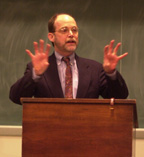 James Hunter |
Hunter is the William R. Kenan Jr. Professor of Sociology and Religious Studies and Director of the Institute for Advanced Studies in Culture at the University of Virginia. His presentation, “On the Moral Purposes of Higher Education,” was the keynote lecture for the Colloquy on Religion and the Liberal Arts, co-sponsored by the Center of Inquiry in the Liberal Arts at Wabash College and The Phi Beta Kappa Society.
According to Hunter, higher learning was generally accepted as a moral endeavor until the last part of the 19th century. “Right through the 1860s, the ideals that guided higher education varied little: any responsible and effective vision of higher education would be predicated on a link between moral formation and intellectual development,” he said.
“The practical aim was to cultivate manners and propagate knowledge among those who would shape the direction of an emerging civilization,” he continued. “The focus of higher education through the better part of the 19th century was not so much on advanced scientific development or on the creative expansion of scholarship within discreet fields of inquiry, but rather on civic responsibility, the development of character, and social integration.”
Education at that time focused on the classics, he said, including the study of Latin, Greek, ancient philosophy and rhetoric. Learning often culminated in a year-long capstone course called “Moral Philosophy” or “Mental Science.” Often taught by the college president, it was designed to help students perceive all knowledge as part of a comprehensive whole.
Without returning to those times, Hunter thinks that we have something to learn from the moral purposes of that period of higher learning. We can learn from the moral ideals that were formulated within the core identity and mission of higher learning, he said.
However, he sees four distinct challenges preventing the step toward a coherent vision of the moral purposes of higher education – transformation and specialization of language; lack of strong common beliefs; separation of knowledge from its moral practices; and politicization of moral discourse within the liberal arts.
Hunter likened the current state of higher education to an airplane that is two hours ahead of schedule, but that has lost track of its destination. “We are going further and further on a machine that is, in every way, second to none,” he said. We are “technologically advanced, free of corruption, staffed by competent professionals at every level, and yet at the same time, as an institution, bereft of a clear sense of direction or coherent moral purpose.”
Hunter proposes we rethink the entire curriculum of the liberal arts in terms of “how to achieve its individual and collective ends in ways that are coherent and compelling.” To do this, an open discussion is needed, he said, while recognizing that liberal arts and religion can provide the moral and spiritual resources for the realization of those important ends.
For more information see: